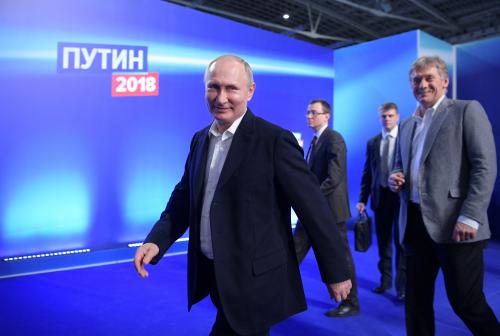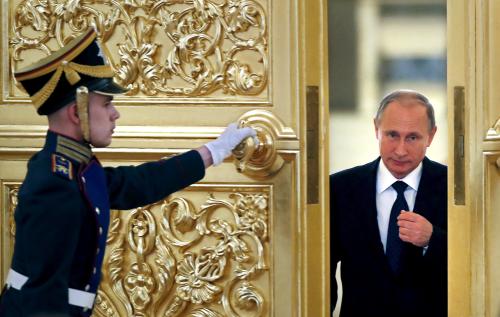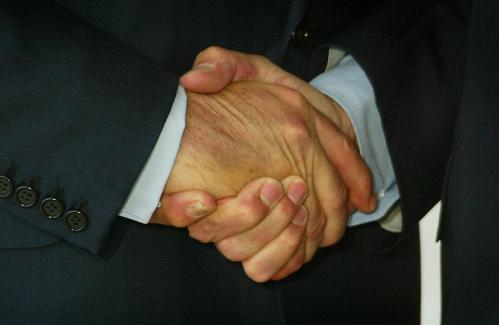Vladimir Putin’s victory is not a surprise, given his reign over the past 18 years during which he eroded state institutions and undercut Russia’s democratic pillars. Since the Russian president cannot promise economic prosperity, he instead distracts citizens and inflates his strongman image through political confrontation with the West.
As I predicted in an op-ed late last month, the outcome of the Russian presidential elections was a forgone conclusion—Vladimir Putin retains his post in the Kremlin for another six years. Elections were not fair and were not equal. Putin’s main opponent, opposition leader Alexei Navalny, was not registered as a candidate; seven other candidates never demonstrated a strong desire to win—their combined result is less than one-third of Putin’s. None of the candidates had even half of Putin’s TV airtime and all were financially constrained.
Putin’s result was supported by massive voter fraud. Observers registered hundreds of falsifications, with flagrant ballot stuffing by officials despite online web monitoring. Election results in local voting stations differed depending on the presence or non-presence of observers. For example, in Chechnya, the North Caucasian ethnic republic run by the former rebel leader Ramzan Kadyrov, those stations with observers reported turnout of between 30-40 percent and Putin’s result was from 60 to 70 percent, while at the voting stations with no observers the turnout reached 100 percent with 93 to 95 percent voting for Putin. According to mathematical analysis from the elections on Sunday, March 18, Putin obtained 9.5 million extra votes. This compares with 8.8 million extra votes in the 2004 elections, and more than 10 million extra votes in 2012.
The desire to hold on to power is a natural one for many politicians. Some employ democratic methods to win elections, and some wait for the right moment to change the rules of the game, drawing their country farther and farther away from political equality. Putin chose the second path. Political transformation in Russia under Putin moved in a consistent direction. Each time he faced a decision on political reforms, he chose the path of greater restriction of freedom. He has never agreed to concessions, opting instead to go on the attack and increase pressure on his opponents.
An 18-year stretch of accruing vertical power has ruined the democratic transformation launched in the beginning of the 1990s. Putin demolished the federative state and re-established Russia as a unitary country where all regional governors are actually nominated and removed by him. By manipulating electoral rules and procedures, he eliminated real political competition in Russia. By subordinating the Russian judiciary to the Kremlin, Putin destroyed the rule of law. He crushed the free media and freedom of speech replacing information with propaganda.
Putin’s upcoming presidential term will focus as always on holding on to power by all possible means so that no one has any reason to doubt his leadership abilities. That’s the goal that will inform his decisions and actions, and that’s why we shouldn’t expect his policies to change. In fact, this has been Putin’s main goal for the past 18 years.
Pressures on freedom of speech in Russia will continue, since freedom of speech will inevitably chip away at the myth of the great leader ruling a strong, unitary nation. This means that Russia will grant no serious powers to the regions or municipalities, and governors will still come to the Kremlin to beg for money to solve regional problems. Federal and regional level elections will be neither free nor fair, since such fairer elections at that level could produce strong independent politicians. Therefore, we should expect rising repression against political opponents and defenders of free speech in Russia.
In the last 4 years, Putin managed to put Russia on the map of power, but at a great cost. His increasingly aggressive and dangerous foreign policy presents existential threat not only to Russian neighbors but to many other countries as well. The invasion of Ukraine and the annexation of the Crimean peninsula, which inspired bloody rebellion in Eastern Ukraine and resulted in more than 10,000 casualties, is one example of what Putin’s aggression has wrought. Others include a state-sponsored doping program during the Sochi Olympics, meddling in the U.S. elections, and cyberattacks against America as well as several other countries. Also under Putin’s rule, mercenaries in Syria entered into direct military confrontation with U.S. troops. Russia’s dark state may also have had a hand in the use of a military-grade nerve agent that poisoned 20 people in London. Such tactics threaten the core values of the western world and menace the West’s safety and stability.
Over the past 10 years, Russia’s economic growth was negligible, recording average annual growth of 0.9 percent and a devaluation of the national currency by more than 50 percent. In terms of economic size, Russia moved from being the sixth to the 12th largest economy in the world, having lost more than a quarter of its GDP in dollar terms. Western sanctions contributed to a poor investment climate and technological isolation, thus dampening growth prospects. After private consumption declined four years in a row, inequality in Russia has increased significantly, and public discontent and dissatisfaction continue to grow.
Since he seems unable to revitalize economic growth, Putin is likely to cement his popularity through the pursuit of an aggressive foreign policy and by convincing citizens that Russia is under attack by western enemies bent on destroying Russia, splitting the nation apart, and grabbing Russia’s natural resources. Russians should have no doubts—only Putin can and will defend their Motherland.
My forthcoming book on Putin’s fateful narrative
Putin’s ambitions for Russia were a mystery when he first came to the Kremlin on the final day of 1999. It’s entirely possible that he had no strategic plan at all, nor any clear vision for his country’s future. But he did have principles and values on which he based his decisions, and those led him unerringly to increase his personal power and to restrict the rights and freedoms of Russian citizens. So far, as a politician, Putin has achieved his goal. But as a president, Putin has been a failure, a dynamic I describe in my forthcoming book, Putin’s Counterrevolution. It recounts how sometimes, in declaring the best of intentions, Russia’s leader made decisions that did not at first seem to fit into any kind of plan or rational sequence. Yet those fateful moves, taken together, turned Russia’s course 180 degrees.
The Brookings Institution is committed to quality, independence, and impact.
We are supported by a diverse array of funders. In line with our values and policies, each Brookings publication represents the sole views of its author(s).






Commentary
One more term for Putin: Dark ambition, dim hopes
March 20, 2018